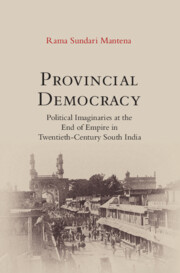Book contents
- Frontmatter
- Contents
- List of Figures
- Acknowledgements
- List of Abbreviations
- Map
- Introduction: Self-Determination, Federation, and Civil Liberties in Twentieth-Century South India
- 1 Liberalism and Anti-Colonialism in South India
- Part I Federation
- Part II Civil Liberties
- Conclusion: After Empire—Language and Regionalism
- Bibliography
- Index
4 - Publicity, Civil Liberties, and Political Life in Princely Hyderabad
Published online by Cambridge University Press: 30 April 2023
- Frontmatter
- Contents
- List of Figures
- Acknowledgements
- List of Abbreviations
- Map
- Introduction: Self-Determination, Federation, and Civil Liberties in Twentieth-Century South India
- 1 Liberalism and Anti-Colonialism in South India
- Part I Federation
- Part II Civil Liberties
- Conclusion: After Empire—Language and Regionalism
- Bibliography
- Index
Summary
The federation debates carried on by the Nizam's administration led to an impasse between the Government of India and the Hyderabad state, with the majority of the political associations and their representatives within Hyderabad shut out of the negotiations. Meanwhile, it is important to note that princely Hyderabad was all the while the site of a thriving civil society in the early twentieth century with a dynamic political landscape. Discussions on the role of the state, civil rights, publicity, and representative government were common in Hyderabad's public organizations, which represented the views and interests of the state's multiple linguistic and religious communities. Two glaring questions confronted the Nizam's administration in the 1930s: the question of sovereignty—more specifically, the political future of the princely state of Hyderabad—and the demand for civil liberties fuelling peoples’ movements at the time. As I have argued in the previous chapter, the Hyderabad state entered into discussions of federation at the Round Table Conferences with a great deal of hesitation, given the lack of real commitments regarding what the state would gain in any federation arrangement. However, it did enter into discussions with the British and the colonial government harbouring ideas about how to regain its sovereignty after the withdrawal of British paramountcy. As Ian Copland has suggested, the Indian princes floated varying sets of political ideologies, and not all agreed on the goal of political reforms within the British Empire. In the second decade of the twentieth century, the princes were simultaneously angling for more influence in managing the relations between the British government and the states while also demanding greater autonomy for the native states to manage their own internal affairs. The latter meant that they would hesitate entering into discussions about internal reforms pertaining to fundamental rights and civil liberties of the states’ peoples.
In 1916, the princely state of Bikaner's Ganga Singh, who was sympathetic to the INC's modern wing's desire for dominion status (what the settler colonies such as Canada and Australia already had), requested that the British government should make self-government within the British Empire the ultimate goal. This was a progressive goal emerging from the princes, inspired by the INC's anticolonial nationalism and agitational politics. This set the princes on track towards multiple interpretations of self-government.
- Type
- Chapter
- Information
- Provincial DemocracyPolitical Imaginaries at the End of Empire in Twentieth-Century South India, pp. 137 - 169Publisher: Cambridge University PressPrint publication year: 2023



